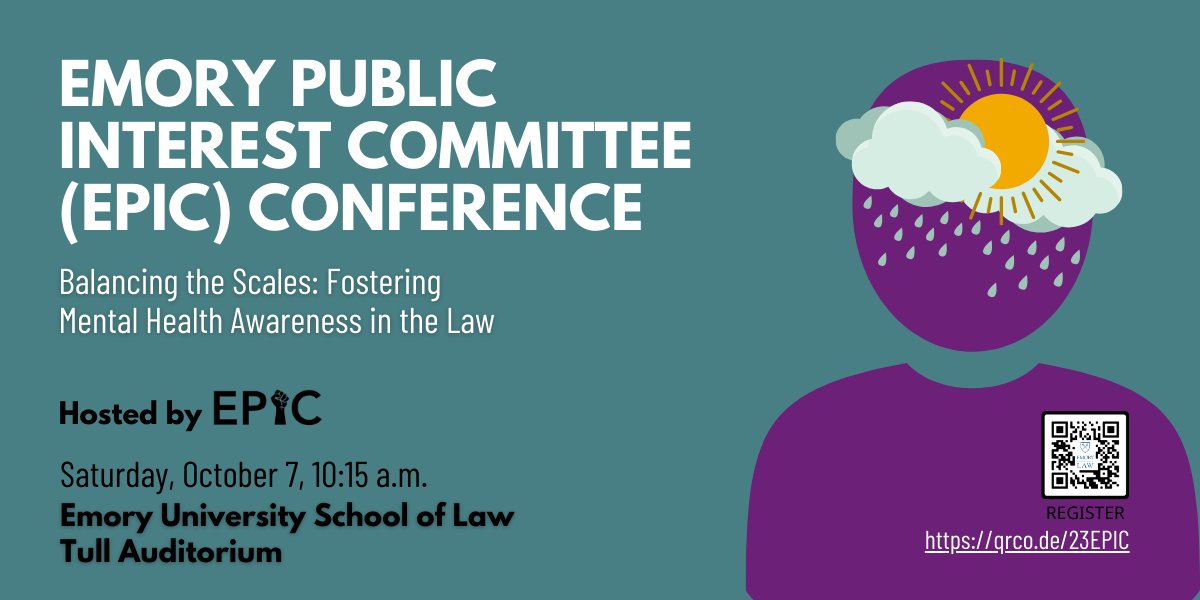
"Balancing the Scales: Fostering Mental Health Awareness in the Law"
Saturday, October 7, 2023
Mental health is an integral and universal aspect of well-being, affecting individuals of all walks of life. “Balancing the Scales: Mental Health Awareness in the Law” will explore how lawyers can take a holistic approach to legal advocacy that addresses the mental health needs of both lawyers and clients alike. This conference will include presentations on how lawyers can be mindful of mental health and trauma-informed in their practice to better serve their clients. Then, recognizing the unique challenges lawyers face in an inherently stressful field, our conference will address the impact of secondary trauma and emphasize the importance of attorney wellness.
Approved for 3.5 Georgia general CLE credits. The Georgia Bar will direct-bill participants requesting CLE credit after the event.
Schedule
10:15 a.m. - Check-in; coffee and tea will be provided
10:45 a.m. to 11:00 a.m. - Welcome, Announcements & Overview
- Mary Anne Bobinski, Dean and Asa Griggs Candler Professor of Law
- Corey Hirokawa, Assistant Director, Center for Public Service
- Elizabeth Bryan and Claudia Cornelison, EPIC Conference Co-Chairs
11:00 a.m. to 11:30 a.m. - The Criminalization of Mental Illness
This session will delve into the complex history of mental health and the criminal justice system. It will examine the impact of the criminalization of mental illness on individuals and society in an attempt to explain how the system got to where it is today.
Speaker: S. Derek Johnson-Gage 03L, The Gage Law Firm
11:40 a.m. to 12:20 p.m. - Exploring Mental Health in Civil Law
This session will provide insight into effectively balancing legal advocacy in civil cases with a sensitive approach to clients’ mental well-being. The panel will discuss strategies and experiences related to maintaining empathy, support, and professionalism throughout the legal process.
Panelists:
- Raneem Ashrawi, Equal Justice Works Fellow
- Sarah Austin 12L, Atlanta Legal Aid
- Sarah Kelsey 16L, Atlanta Legal Aid Disability Integration Project
Lunch Break
1:05 p.m. to 1:45 p.m. - A Guide to Trauma-Informed Client Care
This session will aim to provide a comprehensive understanding of trauma-informed care, emphasizing its importance in the legal setting. It will provide insight into the principles and practices that promote a supportive and healing environment for individuals affected by trauma.
Panelists:
- Adriana Heffley, Legal Director at Georgia Asylum and Immigration Network (GAIN)
- Christina Scott, Assistant Clinical Professor in the Health Law Partnership Legal Services Clinic (HeLP) at Georgia State University
1:55 p.m. to 2:40 p.m. - Secondary Trauma in Legal Practice
This session will address the impact of secondary trauma, focusing on the emotional and psychological impact it can have on legal professionals. It will explore how exposure to others’ trauma can have a significant impact on an individual’s own mental health and state of well-being, while also discussing strategies for managing these impacts.
Speaker: Cecil Walker, Psychotherapist, Center for Victims of Torture
2:50 p.m. to 3:50 p.m. - Wellness in a Demanding Profession
This session will highlight the importance of self care and mindfulness for legal professionals. It will offer valuable insights into strategies for lawyers to navigate the unique challenges of their profession while maintaining a healthy work-life balance.
Speakers:
- Candice McKinley, C. McKinley Law & Associates, Director of Regional Impact Leadership for Educational Equity
- Joy White, The White Legal Group, Founder and CEO of Flawed Masterpiece
3:50 p.m. to 4:10 p.m. - Pro Bono Certificate Awards
4:10 p.m. to 4:15 p.m. - Closing Remarks
Reception to Follow.